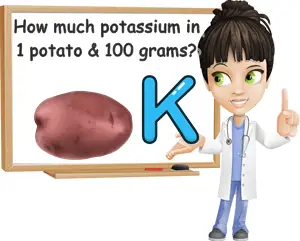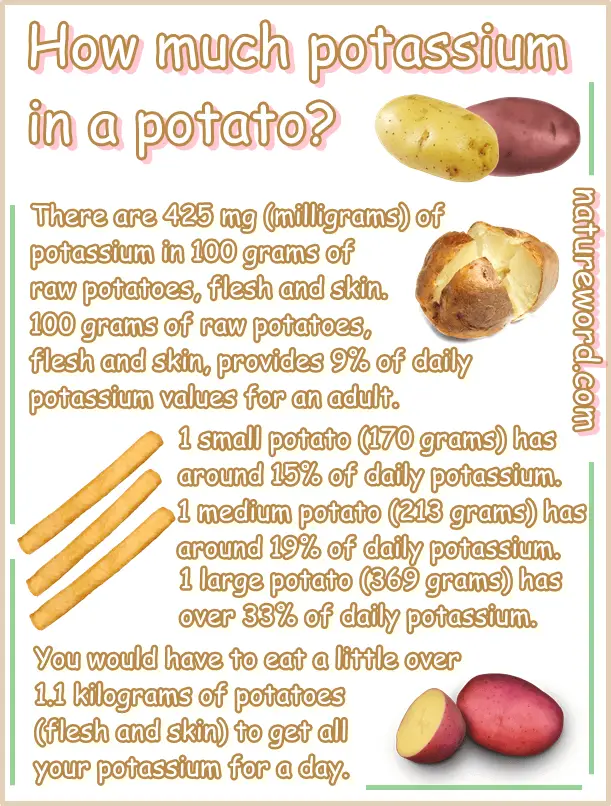How much potassium is there in a potato? How much of your daily values of potassium does one potato provide? Are potatoes high in potassium? What is the content of potassium in potatoes compared to other foods such as avocado, spinach, bananas or carrots? How many servings of potato do you have to eat to get all of your daily values of potassium?
How much potassium per day?
The average adult with an estimated daily calorie intake of 2000 kcal (kilocalories) needs 4700 mg (milligrams) or 4.7 g (grams) of potassium per day, according to the new dietary guidelines for essential vitamins, minerals and other dietary nutrients. The recommended daily intake (RDI) of potassium has been raised from 3500 mg (3.5 g) per day to 4700 mg (4.7 g) which marks a significant increase.

How much potassium in potatoes?
- There are 425 mg (milligrams) of potassium in 100 grams of raw potatoes, flesh and skin (average value for all commercial varieties).
- There are 319 milligrams of potassium in one cup (75 grams) of diced potatoes, raw, flesh and skin.
- There are 417 mg (milligrams) of potassium in 100 grams of raw russet potatoes, flesh and skin.
- There are 313 milligrams of potassium in one cup (75 grams) of diced russet potatoes, raw, flesh and skin.
- There are 455 milligrams of potassium in 100 grams of raw red potatoes, flesh and skin.
- There are 341 milligrams of potassium in one cup (75 grams) of red potatoes, raw, flesh and skin.
Note: There are a few dozen different potato cultivars. While all the different cultivated varieties of potatoes are practically the same food, their nutrition as in essential vitamins and dietary minerals, and sometimes also macronutrients content and profile, notably carbohydrates, may vary. Starch content in particular. However, the variations in nutritional value across the different varieties of the same food are usually negligible, and the impact on daily nutritional requirements and overall health is minimal at most when consumed in normal food amounts.
How much potassium in one potato?
- There are 722 milligrams of potassium in one small potato at an estimated weight of 170 grams (flesh and skin).
- There are 905 milligrams of potassium in one medium potato at an estimated weight of 213 grams.
- There are 1570 milligrams of potassium in one large potato at an estimated weight of 369 grams.
Note: Nutritional values presented are an estimate for readily available commercial varieties of white, yellow, red and russet potatoes, flesh and skin.
- There are 709 milligrams of potassium in one small russet potato at an estimated weight of 170 grams (flesh and skin).
- There are 888 milligrams of potassium in one medium russet potato at an estimated weight of 213 grams.
- There are 1540 milligrams of potassium in one large russet potato at an estimated weight of 369 grams.

- There are 774 milligrams of potassium in one small red potato at an estimated weight of 170 grams (flesh and skin).
- There are 969 milligrams of potassium in one medium red potato at an estimated weight of 213 grams.
- There are 1680 milligrams of potassium in one large red potato at an estimated weight of 369 grams.
Also see what is the potassium content for cooked potatoes, including French fries, baked potatoes and boiled potatoes.
How high in potassium are potatoes?
- 100 grams of raw potatoes, flesh and skin, provides 9% of daily potassium values for the average adult (estimated potassium content for all commercial varieties).
- One cup (75 grams) of diced potatoes, raw, flesh and skin, provides 6.8% of daily potassium values.
- 100 grams of raw russet potatoes, flesh and skin, provides 8.8% of daily potassium values for the average adult.
- One cup (75 grams) of diced russet potatoes, raw, flesh and skin, provides 6.6% of daily potassium values.
- 100 grams of raw red potatoes, flesh and skin, provides 9.7% of daily potassium values for the average adult.
- One cup (75 grams) of diced red potatoes, raw, flesh and skin, provides 7.2% of daily potassium values.
- Just 1 small potato, raw, skin and flesh, with an estimated weight of 170 grams, provides a little over 15% of total daily potassium values for the average adult.
- Just 1 medium potato, raw, skin and flesh, with an estimated weight of 213 grams, provides a little over 19% of daily potassium values for an adult.
- Just 1 large potato, raw, skin and flesh, with an estimated weight of 369 grams, provides 33.4% of daily potassium values for an adult.
- 1 small russet potato, raw, skin and flesh, with an estimated weight of 170 grams, provides 15% of daily potassium requirements for the average adult.
- 1 medium russet potato, raw, skin and flesh, with an estimated weight of 213 grams, provides 18.8% of total daily potassium requirements for an adult.
- 1 large russet potato, raw, skin and flesh, with an estimated weight of 369 grams, provides 32.7% of total daily potassium requirements for an adult.
- 1 small red potato, raw, skin and flesh, with an estimated weight of 170 grams, provides close to 16.5% of daily potassium for an adult person.
- 1 medium red potato, raw, skin and flesh, with an estimated weight of 213 grams, provides close to 21% of daily potassium for an adult person.
- 1 large red potato, raw, skin and flesh, with an estimated weight of 369 grams, provides close to 36% of daily potassium for an adult person.
Are potatoes a food high in potassium?
Potatoes have more potassium than bananas and other culinary fruits, but less than spinach, avocado, beet leaves, nuts and seeds.
However, given the fact that potatoes are meant to be consumed in higher amounts of up to 300 grams per serving, they remain one of the foods highest in potassium you can eat.
To build a clearer picture, most culinary fruits are naturally very low in potassium with an average potassium content of around 2% and up to 4-5% of daily values per 100-gram serving.
Most dried nuts and seeds however provide around 15% of daily potassium per 100 grams which would make them the better choice.
However, considering the recommended serving is 1/4 or 1/3 of that (25 to 30 grams tops), the potassium content per standard serving of nuts and seeds ends up being on par with or lower than that of potatoes per 100 grams.
And you can usually eat up to 300 grams of potatoes per serving.
How many potatoes do you have to eat to get all of your daily potassium?
The average adult needs 4700 milligrams of potassium a day, every day, according to the new dietary guidelines for essential vitamins and dietary minerals. The standard serving size for potatoes ranges from 200 to 300 grams which would account for 18% to 27% of daily values for an adult person.
To get all of the potassium they need in a day from just potatoes, the average adult would have to eat a little over 1.1 kilograms (1100+ grams) of potatoes, flesh and skin.
Note: Because differently cultivars cook differently, and there are so many options and preferences when it comes to cooking potatoes, to determine with more accuracy just how much of your daily potassium you are getting, it’s best to weigh your potatoes raw prior to cooking.
Potato skin is a big source of dietary potassium and contributes to daily values significantly, as per the numbers presented which consider potatoes flesh and skin.
Discarding the skin means losing a measurable part of the potassium content of the tubers, and other nutritional benefits.
However, although you can technically eat potato skins, in the sense that they are edible, it’s not always good to do so, or safe.
While you can eat potatoes whole, flesh and skin, it’s only good to eat potato skins if the tubers are from organic agriculture as the skin of foods usually retains the bulk of pesticides used during the growing season.
Also, only young tubers have a palatable skin – above a certain size, potatoes become too mature and the skin excessively tough, in some cultivars more than in others.
Potassium content in potatoes vs other foods
Potassium content estimates per 100 grams of raw potatoes and other foods:
- Potatoes: 9% of daily values for the average adult
- Carrots potassium content: 7% of daily values
- Blueberries: less than 2% of daily values
- Apples potassium content: 2%
- Oranges potassium content: 4%
- Orange juice potassium content: 4%
- Green beans: 4%
- Apricots (fresh): 6%
- Broccoli potassium content: 7%
- Beets: 7%
- Butternut squash: 7%
- Brussels sprouts: 8%
- Banana potassium content: 8%
- Avocado potassium content: 10%
- Spinach potassium content: 12%
- Brazil nuts: 14%
- Cashews: 14%
- Almonds: 15%
- Beet leaves: 16%
- Fava beans (broad beans): 23%
- Apricots (dried): 25%
